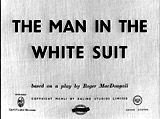
|
The Man in the White Suit
(1951, UK)
Director and co-writer Alexander Mackendrick's post-war
Ealing Studios satirical comedy about capitalism was one of many
similar films at the time that featured actor Alec Guinness:
- the film opened with a view of Birnley's textile
mill and its owner recalling: "Now that calm and sanity
have returned to the textile industry, I feel it my duty to reveal
something of the true story behind the recent crisis, a story which
we were, happily, able to keep out of the newspapers at the time"
- in
the plot (with elements of sci-fi) told in a flashback, oddball,
idealistic, brilliant-minded inventor and often-fired 'mad scientist'
chemist Sidney "Sid" Stratton
(Alec Guinness) was employed as a lowly, menial worker at a Wellsborough
textile factory in Northern England
- Stratton was using the firm's research
laboratories to obsessively and surreptitiously perform his own experiments,
with equipment consisting of long tubes of gurgling liquids (one
of the film's continuing auditory themes); when found to be using
the equipment and facilities unauthorized, he resigned before being
fired by irate mill owner Michael Corland (Michael Gough); Corland
was engaged to marry Daphne Birnley (Joan Greenwood), the rebellious
daughter of a rival textile mill owner
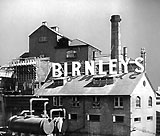
Birnley's Textile Mill
|
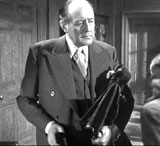
Factory Owner Alan Birnley (Cecil Parker), Daphne's
Imperious Father
|
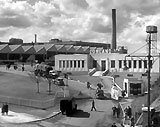
Corland Mill Factory
|
- he found a way to pose as a worker at Birnley Mills,
a rival mill owned by wealthy Alan Birnley (Cecil Parker); likewise
in their laboratories with their expensive equipment and supplies
(valued at 8,000 pounds), Stratton was experimenting on an invention
"to astound the world" - a revolutionary, 'long-chain molecule'
textile product; he ran out of the lab, screaming: "I've done it!
I've done it!", but he was initially regarded as a "lunatic" until
Daphne was inspired to speak to her father about the
worthiness of his findings
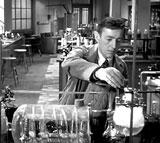
|
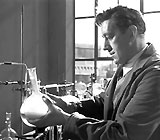
|
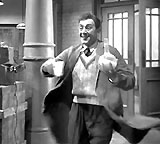
|
Stratton Working on His Technological
Invention
in the Lab at Birnley Mills and Screaming Out: "I've done it!
I've done it!"
|
- Daphne announced to her father the importance of
Stratton's invention: "He's made a new kind of cloth. It never
gets dirty, and it lasts forever"; at
first, the free-thinking Stratton's scientific discovery and further
exclusive research was embraced and financed by Birnley; however,
there were strong doubts about Stratton's "tomfoolery" in the lab
after multiple explosions in the building led to extensive
damage and bills of over 20,000 pounds
- however, the experiments eventually led to success
- Stratton was able to create a new fabric that could serve as
a substitute for wool, cotton, or linen; one problem was that the
new unbreakable textile repelled dye just as it did dirt, so a
method to color the fabric would have to be devised
- the film's title referred to the brilliant-white,
slightly-luminous suit that Stratton constructed for himself with
the miraculous material (including radioactive thorium); Daphne
dubbed him: "A knight in shining armor"
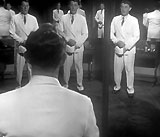
|
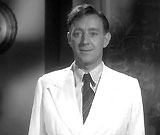
|
|
"The Man in the White Suit"
|
- the mill owner's daughter
Daphne Birnley was inspired
by Sidney's indestructible cloth fiber invention; she took his side
as a crusader for progress: ("Millions of people all over the
world, living lives of drudgery, fighting an endless losing battle
against shabbiness and dirt. You've won that battle for them. You've
set them free. The whole world's going to bless you")
- textile industry patriarch Sir John Kierlaw (Ernest
Thesiger) was summoned to Birnley's factory to consult about the
product; textile mogul Birnley was enthusiastic: "It'll knock
the bottom out of everything, right down to the primary producers...It'll
ruin all of them!", although he also admitted the product
would be disastrous and engender chaos and disruption: ("I'll
admit some individuals may suffer temporarily. But I will not stand
in the way of progress"); doubts were also expressed about
how the revolutionary fabric would directly compete with textile
factory owners (and the workers) and their businesses, who would
lose everything: ("But if this stuff never wears out, we'll
only have one lot to make...Six months' work and that'll be the
lot. Every mill in the country will be laid off")
- in a devastating turn-around, during the closed-door
business meeting between Stratton and the major mill owners, they
announced that they had decided to pay him off to monopolize his
product and work; they reasoned that if they didn't assume full
control, it was feared that the new textile "might upset the
delicate balance of the market", or might be sold to a competitor
that could ruin them; there were efforts to pressure Stratton to
give up complete control of his product/idea by paying him a quarter
of a million pounds; Stratton refused, and after being physically
restrained, he had to fight his way out of the room to escape
- Daily Express newspaper headlines proclaimed
fears of a disastrous market decline: "EVERLASTING THREAD SCARES
MILL TOWN"; the textile moguls thought of a new strategy: "There's
only one thing that'll pull the market together, and that is a
denial backed with suppression, total and permanent... issue a
categorical denial to the press. The stuff does not exist. It has
never been invented. It never could be. There is no panic here
whatsoever"
- meanwhile, the group also decided to use Stratton's
attractive friend Daphne Birnley to pressure him to sell the "world
rights" to his new discovery; they tried to persuade her to help
them convince Stratton to give up his idea: "You must realize how
reckless exploitation of anything new would upset the delicate
balance of trade"; she bargained for a payment of 5,000 pounds
to do their bidding
- the enticing Daphne spoke to Stratton and confided
that she would escape with him from the mill-town if he would take
the owners' lucrative offer: "I want what's best for you...I
hate this town. The mill. Everything. People who think of nothing
but money-grubbing...I want to get away, Sidney. I want to see
something of the world beyond this dirty little town...I know what
they offered you. You could live the rest of your life on it. Go
anywhere. Do as you please. And if you want me - I'd come too";
even after kissing him, he refused, and she was relieved that he
didn't give in; she suggested helping him to publicize the entire
truth about the story surrounding the product: "We've got
to get that suit to the newspapers. Show it to them and tell them
the whole story. That will blow the lid off everything, and they'll
never get it back on"
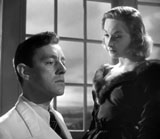
|

|
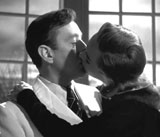
|
|
Daphne's Attempt to Speak to Stratton To Convince
Him To Give In
|
- in the film's astounding
conclusion, Stratton (wearing his glowing white suit) was chased
by a mob (of mill owners joined with striking workers, or CAPITAL
and LABOR) that pursued him through night-time streets, to curb
his invention; during the chase, he was met by his elderly landlady
and washerwoman Mrs. Watson (Edie Martin), and he begged her to
cover his glowing suit to hide him; she rejected him: "Why
can't you scientists leave things alone? What about my bit of washin',
when there's no washin' to do?"
- unexpectedly, the material used to construct his
suit was found to be unstable; the threads began to deteriorate
like tissue paper and tore apart; Sidney realized he must surrender
and he stopped fleeing - he was surrounded by members of the street
mob (mill owner managers and trade union mill worker employees)
as they ripped the suit from Sidney's body, leaving him only in
his underwear, shirt and tie as they laughed and screamed: "It
doesn't work! It's coming to pieces! We're saved!"
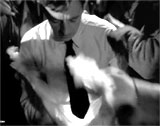
|
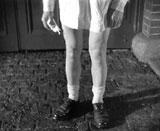
|
|
Sidney's Deteriorating White Suit
|
- the film ended with Birnley's summation (voice-over):
"The crisis is over now. The news of Sidney's failure brought relief
to the world. It had been a hard and bitter experience for all
of us. But we faced the future with confidence. We have seen the
last of Sidney Stratton...At least, I hope we've seen the last
of him"
- in the film's final moments, Sidney had again been
fired. On the street outside Birnley Mills, he had an a-ha revelatory
moment ("I see") and realized how he could fix his polymer
fabric, and hurriedly walked off. With a knowing grin, he realized
how he could improve his formulaic creation - he would undoubtedly
begin again after discovering the flaw in his original textile
invention.
|
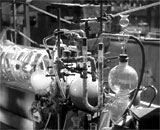
Sidney Stratton's Research Equipment (Bubbling Tubes) in
Corland's Textile Factory Laboratory
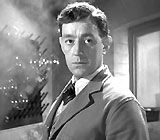
Sidney "Sid" Stratton (Alec Guinness)
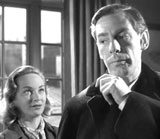
Mill Owner Michael Corland (Michael Gough) with Fiancee Daphne Birnley
(Joan Greenwood), Daughter of Rival Mill Owner

Daphne to Her Father: "He's made a new kind of cloth"
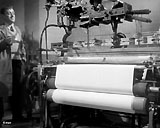
Stratton's Loom to Produce the New White Fabric
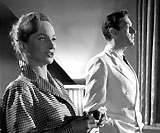
Daphne Inspired by Stratton's Crusade to Seek Progress
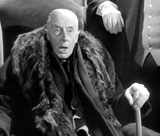
Textile Industry Patriarch Sir John Kierlaw (Ernest Thesiger)
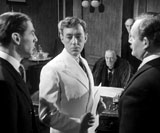
Failed Efforts to Pay Off Stratton to Prevent Chaos in the Textile Industry
- He Refused to Be Paid Off
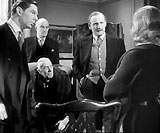
Convincing Daphne Birnley to Speak to Stratton to Give Up His "World Rights"
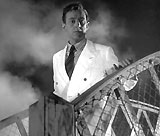
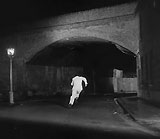
The Concluding Chase After Stratton by Mill Owners and Striking Workers
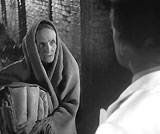
Washerwoman to Stratton: "Why can't you scientists leave things alone?"
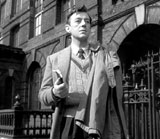
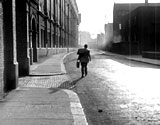
Film's Hopeful Ending - Sidney: "I see"
|















